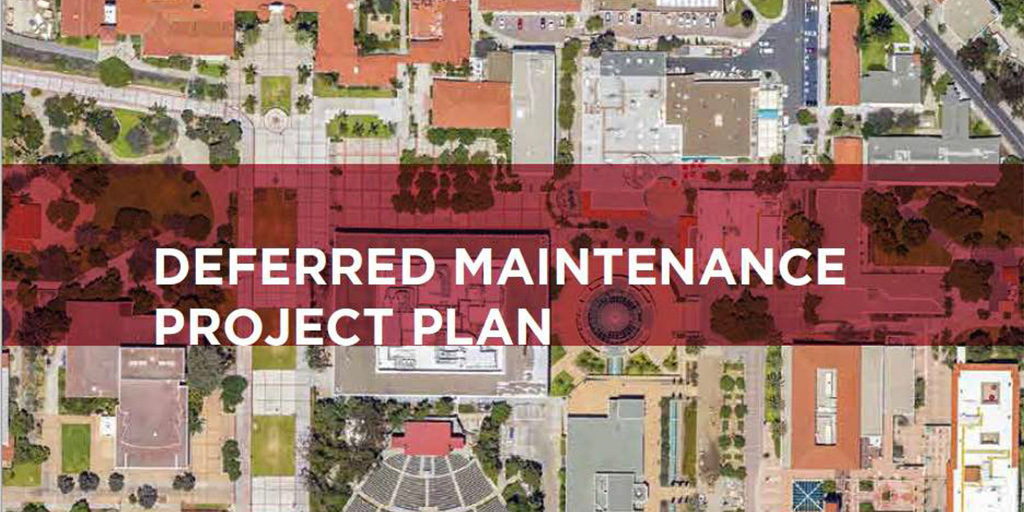Deferred Maintenance
Campus facilities require routine, preventative, and corrective maintenance to keep infrastructure, building systems, and equipment operational.
Deferred maintenance (DM) refers to delaying repair and/or replacement of aged or deficient equipment or building systems based on a lack of available resources (funding and/or personnel) to complete the needed work.
The exact cost of deferred maintenance is difficult to determine on a campus of our size and age.
In an effort to determine the scale and scope of the deferred maintenance on our campus, San Diego State University (SDSU), together with the California State University (CSU) system, contracted with Intelligent Systems and Engineering Services (ISES) in 2024 to conduct a Facility Condition Analysis (FCA) for all of the state-funded buildings. ISES identified a deferred maintenance and capital renewal budget of over $893 million, which they concluded should be spent over the next 10 years in order to address the identified outstanding issues.
The FCA costs do not reflect the entirety of replacement of systems and equipment and are only associated with state-funded academic and administrative buildings and do not include infrastructure, such as utilities and roadways, or costs associated with program enhancements that meet current academic or mission-driven requirements.
Similar to other public universities throughout the country, SDSU has a deferred maintenance backlog due to a lack of adequate state funding to address the normal maintenance and capital renewal needs, which have accumulated over a number of years.
Historic capital funding models for higher education focus on providing funding for new construction and major renovations without adequately addressing the cost for long term maintenance and renewal.
SDSU is working with multiple stakeholders to address deferred maintenance. First, the Facilities Services department utilized its collective and extensive knowledge of the campus to compile a list of known deferred maintenance issues. Once the list was created, it was presented to the Deferred Maintenance Advisory Committee (DMAC).
The DMAC is composed of faculty, staff, and a student representative from Associated Students (A.S.) tasked with reviewing deferred maintenance projects, assessing the priority level of each project, and ensuring projects will benefit the university community. The committee ultimately makes recommendations to the Vice President of Business and Financial Affairs and the SDSU President to fund proposed repairs.
Eric Hansen, AVP - BFA - Business Operations (Chair)
Amanda Alpiner, Campus Planner - Planning, Design, & Construction
Amanda Scheidlinger, Director of Construction - Planning, Design, & Construction
Bob Schulz, AVP - Real Estate, Planning, & Development - BFA
Crystal Little, AVP - Financial Operations - BFA
VACANT, Executive Director - Facilities Services
Gillian Marks, Senior Director - Environmental Health & Safety and Risk Programs
Heather Canary, Director of School of Communication - College of Professional Studies and Fine Arts
Kara Peterson, Director of Planning - Planning, Design, & Construction
Kathleen Davis, Director - Project Management
Katie Olivo, Director - Budget & Finance
Andrea Altmann, Director - Office of Energy & Sustainability
Maribel Madero, Campus Administrator - SDSU Imperial Valley
Maureen Dotson, Facility Coordinator - Love Library
Rashmi Praba, AVP - Student Affairs & Campus Diversity
Sonja Pruitt-Lord, Interim Vice Provost - Academic Affairs
Steve Gill - Fowler College of Business (University Senate Rep.)
Tod Reeder, Associate Dean - College of Science
Andrea Alaniz - Associated Students
Marco Loza - Associated Students
Ramon Hermosillo, Assistant Director of Projects & Construction - Facilities Services (Support)
Shawn Lantz, Project Manager - Project Management (Support)
SDSU has identified several strategies and solutions to fund the university’s deferred maintenance. One of the primary solutions SDSU has long relied on is CSU annual capital funding and one-time state allocations. In addition, SDSU has supplemented these dollars by soliciting available discretionary money through the President’s Budget Advisory Committee (PBAC) and by utilizing reserves if/when there have been system or infrastructure failures. The average annual allocation for deferred maintenance has been approximately $18 million per year for the past 10 years.
The CSU continues to advocate to the legislature for additional targeted funding to address systemwide deferred maintenance needs.
